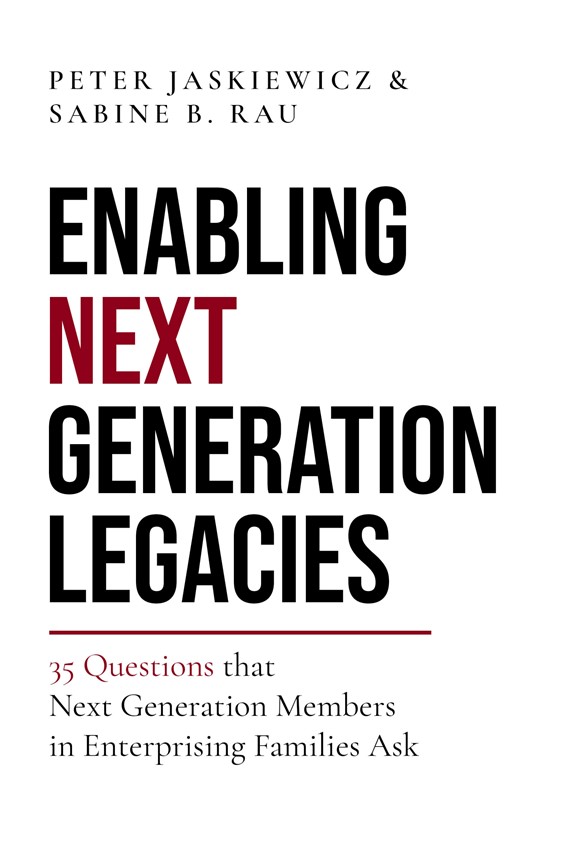The Family Enterprise Legacy Institute has been featuring select parts from the book, Enabling Next Generation Legacies: 35 Questions That Next Generation Members in Enterprising Families Ask.
The result of years of international research and practical experience, Enabling Next Generation Legacies delves into the unique challenges that confront family enterprises.
Telfer professors Peter Jaskiewicz and Sabine Rau have brought together the world’s leading academics, practitioners, and enterprising families to answer the most pressing questions faced by Next Generation members in a short and concise, yet meaningful way.
The book consists of best practices, real-life examples, and additional critical questions for reflection from nearly 100 contributors from 27 different countries. Expert commentaries come from members of the world’s leading family businesses including Auchan (France), Saputo (Canada), and Sabra (Israel), as well as from various academic experts from business schools around the globe like Kellogg, IMD, and INSEAD.
Below, read an expert response to a pressing question raised by Next Generation members.
It is difficult to imagine that we can become responsible business owners one day. What type of development path can we pursue to learn more about becoming responsible owners?
Response by Rosa Nelly Trevinyo-Rodríguez, México, and Miguel Ángel Gallo, Spain

Developing the talents of Next Gens as potential, responsible owners is a high priority for 67 percent of global families in business and their family offices. But the success of such ownership education programs and internships is mixed.i Why is it that some Next Gens manage to become responsible owners and others do not?
Becoming a responsible owner takes time, effort, and commitment. It’s a continuous, never-ending process influenced by our knowledge and business competence, as well as by our motivations, emotions, and experiences. Viewed in this way, what type of actions shall Next Gens embrace in order to build up and nurture a solid, responsible business owner track?
1. Committing to the Owners’ Role: Exploring Ownership Matters
Becoming a (future) good family business owner implies voluntarily embracing the (future) ownership role and committing to it. Yet, in order to do so, Next Gens are expected to have enough information, education, and professional skills. Understanding owners’ rights and responsibilities as well as learning about corporate law, governance structures, estate planning, fiduciary arrangements, talent management, employee relations, business financial statements, and tax matters are all fundamentals in order to join the starting line of the family business “responsible business owner track.”
Next Gens must also pursue a specific training related to their own family company. Attending company visits, taking part in meetings with top management teams, and having briefings with high-profile managers, executives, and board members will help in this process. Gaining knowledge of their family business history, values, and vision will help Next Gens realize their heritage. In addition, grasping the family firm’s strategy, market potential, business units and operational processes, products and services, and budgetary elements will allow Next Gens to better understand the here and now of their business.
2. Communicating Well: Active Listening and Empathy
Making conscious, individual efforts to get to know, care about and enjoy all family members is essential if a long-term personal and professional relationship is to be sought. Trust-building for Next Gens begins with developing the habit of calling or texting each family member every month—just to stay tuned. Yet, communicating well takes practice, effort, active listening, and empathy.
Case in point: Mathias wants to talk to his older brother—the CEO of the family business—about starting his own new enterprise. He needs a sounding board rather than more time to think alone. Both agree to meet for coffee that evening. After greeting each other, Mathias starts sharing his ideas for about two minutes. His older brother interrupts him and brings up certain business problems he is facing. Then, his phone rings. After the fifteen-minute call, the CEO brother says, “Bro, just look at the size of our family firm. We are a global business. Considering setting up such a tiny enterprise is nonsense, and anyway, we are not investing in it, so don’t even bother. Let’s focus on the actual business problems we have to solve, okay?” He stands up, gives his brother a pat on the shoulder and leaves.
Communicating well requires stopping whatever we are doing to pay attention, listen, and value what the other person has to say—while not assuming what the other wants—and interpreting the emotions behind the words. Feeling heard and understood builds up trust and caring among family members. Patronizing and ignoring a family member’s ideas and feelings shuts down the communication process and drives division and indifference.
3. Nurturing Legitimacy: Learning to Carry Out an Insightful Use of (Future) Power
Legal ownership and its voting rights are the most straightforward types of authority owners can exert. Legitimacy is, on the other hand, an intangible asset tied to knowledge, prestige, and good reputation deriving from moral authority that provides the basis for cementing alliances, inspiring people, and influencing decision-making. While legal power is granted, legitimacy—both in the family and in the business—is gained, nurtured, and constantly upgraded. Next Gens must strive to attain legitimacy early in their life (even before having or exercising legal ownership), and committing themselves to advance it by practicing compassionate attitudes, such as:
Humbleness. Avoiding the “I know it all/I deserve it all” attitude. Valuing others and being open to learn and seek feedback from predecessors, employees, advisors, and other family members. ii
As an illustration: When Susan was appointed to the board of directors of her family company, she recognized that even when she had an MBA and seven years of working experience, she was not fully prepared to serve as a board member. Thus, she asked for help. The board assigned her an external mentor who accompanied her as full-fledged member of the board of directors for one-and-a-half years. “It was the most valuable experience I could have had. It allowed me to practice and learn—that is, to make errors without messing up with the firm—and to become a valuable board member.”
Coherence. By respectfully noticing inappropriate or disrespectful behaviors among family or nonfamily members, and taking action on them, Next Gens live and reinforce their values, gaining credibility and good reputation.
Family Diplomacy. Next Gens must consider the welfare of all stakeholders and become skilled at the practice of consensus building, committing themselves to cultivate, build and rebuild the family business owners’ relationships. Fostering family-wide activities (i.e., family assemblies) to promote inclusion and transparency helps to integrate family members (owners) and to align their collective interests.
Gratitude. Being conscious and thankful for all the positive things one has received from the family and business, valuing the efforts (sacrifices) made by predecessors, and realizing that ownership rights are not granted is fundamental for Next Gens to build up their moral authority. Moreover, since stewardship and gratitude go hand in hand, this practice also entails nurturing the family’s legacy and preparing, in due course, a potential successor.
To Wrap Things Up
Committing to forge a responsible owner career is a never-ending process that involves family and business acumen, personal interest, passion for doing well by doing good, communication and consensus building skills, the practice of humbleness, coherence, family diplomacy, and gratitude as well as tons of prudence and moderation. A responsible Next Gen owner turns out to be an engine and a vehicle of family cohesion. Their commitment to behave in a professional and judicious way—family- and business-wise—compels other family members (owners) to stick together, and in this way, secures the future of the family’s shared business dream.
Rosa Nelly Trevinyo-Rodríguez, PhD, has been contributing to the family business practice, knowledge creation and dissemination over the last twenty years. She is CEO of Trevinyo-Rodríguez & Associates—an organization that advises business families—founder of the Tec de Monterrey Family Business Center and Author of the bestseller Family Business: A Latin-American Perspective. Dr. Trevinyo-Rodríguez serves as a board member in leading family-owned companies, advises single-family offices, has delivered more than 150 executive courses and C-Suite international conferences, and became the first Latino president of the Academy of Management International Theme Committee and chair of the Management Consulting Division.
Miguel Ángel Gallo, PhD, is emeritus professor of general management at IESE Business School (Spain), where he served as full professor (1975–2003) and IESE PhD Program Director (1980–1990). He was founding director of the first Family Business Chair in Europe—acting as its chairman from its inception in 1987 until September 2003. His areas of specialization include strategic management, boards of directors and family business. Prof. Gallo is fellow of the Royal European Academy of Doctors, Strategic Management Society and serves as honorary president of the International Family Enterprise Research Academy (IFERA). He has participated on the boards of prominent firms Grupo VELATIA, Fuertegroup, and Grupo Senda.
Enabling Next Generation Legacies: 35 Questions That Next Generation Members in Enterprising Families Ask is now available in eBook and hardcopy. All royalties from Enabling Next Generation Legacies go towards the University of Ottawa’s Telfer Fund, helping students in need. Learn more at www.35questions.com.
References
2.8 It Is Difficult to Imagine That We Can Become Responsible Business Owners One Day. What Type of Development Path Can We Pursue to Learn More about Becoming Responsible Owners?
i Richard Hockley, Isadora Pereira and Gabriele Schmidt, UBS Global Family Office Report (London: UBS AG, 2020). https://www.ubs.com/global/en/wealth-management/uhnw/global-family-office-report/global-family-office-report-2020.html
ii Rosa Nelly Trevinyo-Rodríguez and Josep Tàpies, “Effective Knowledge Transfer in Family Firms,” in Handbook of Research on Family Business, eds. Panikkos Poutziouris, Kosmas Smyrnios and Sabine B. Klein (Cheltenham: Elgar Publishing, 2006), 343-357.










